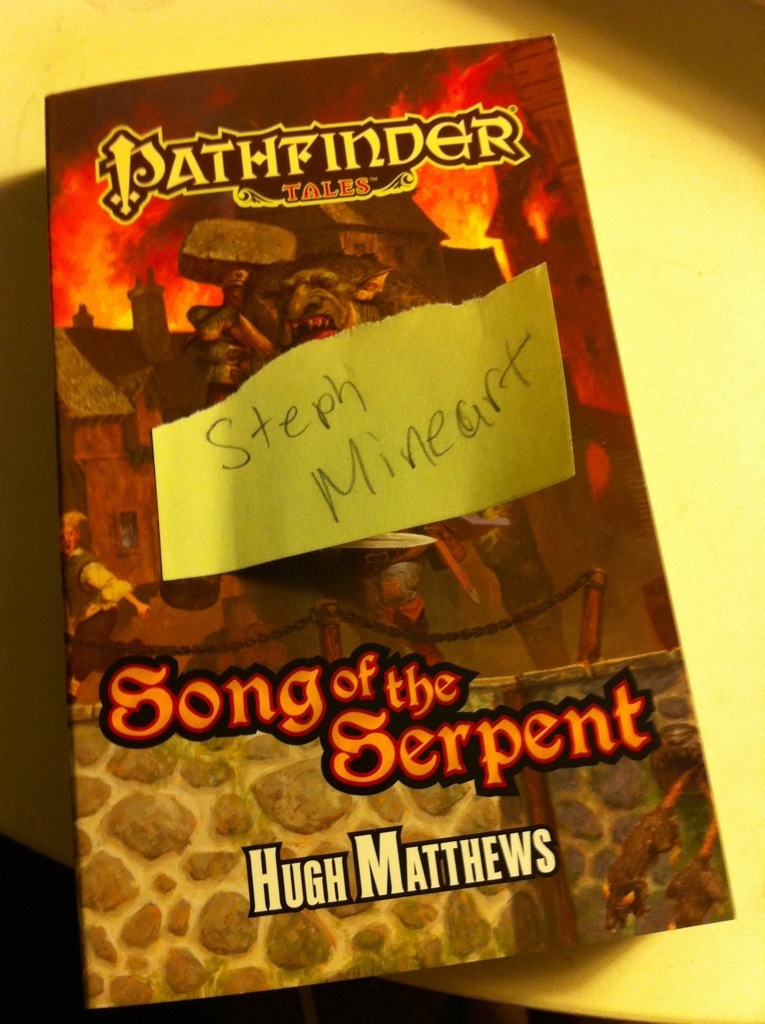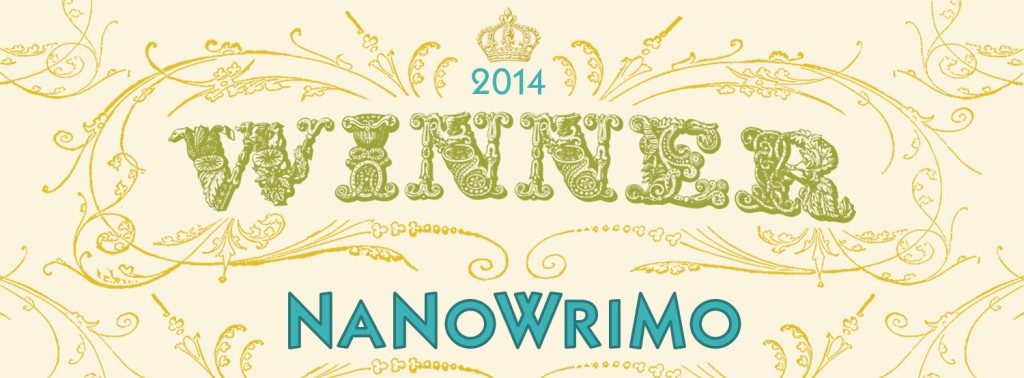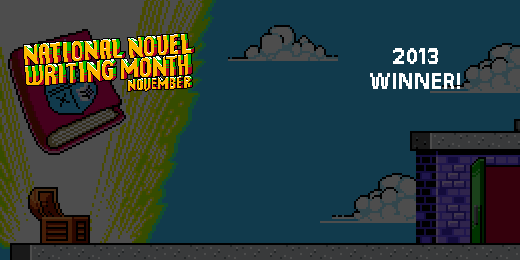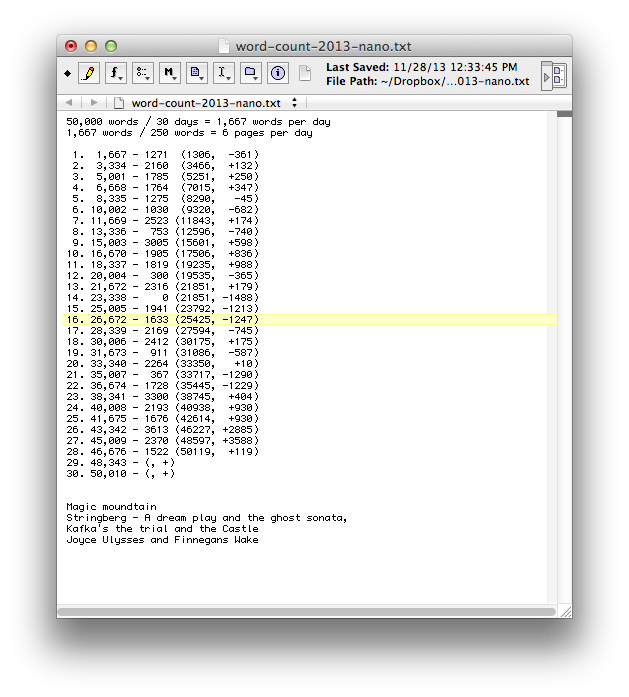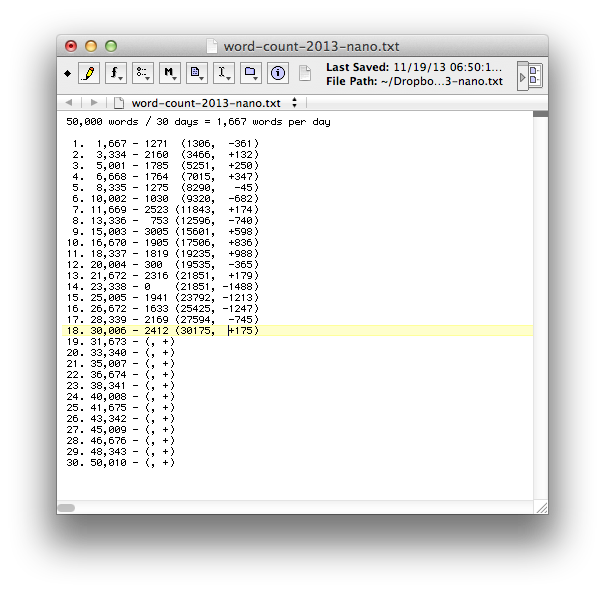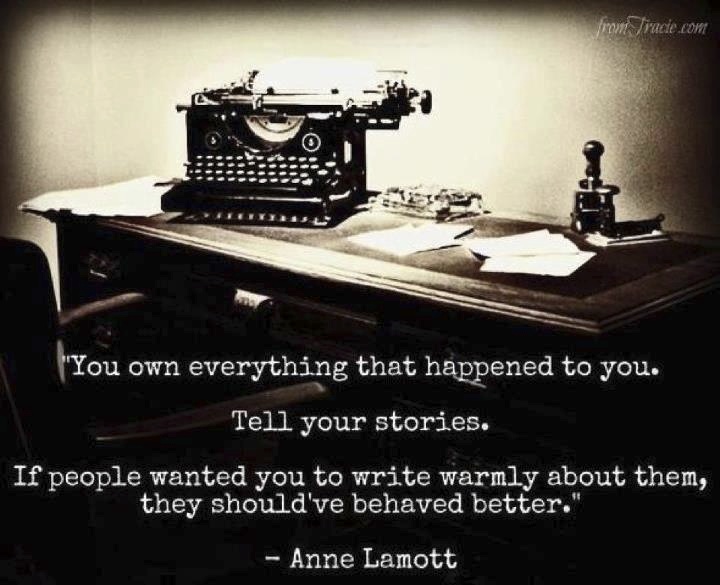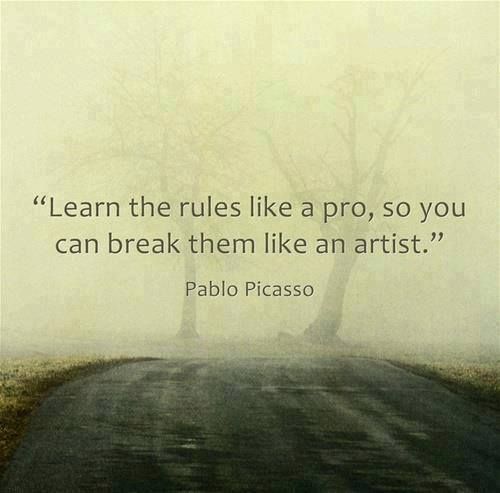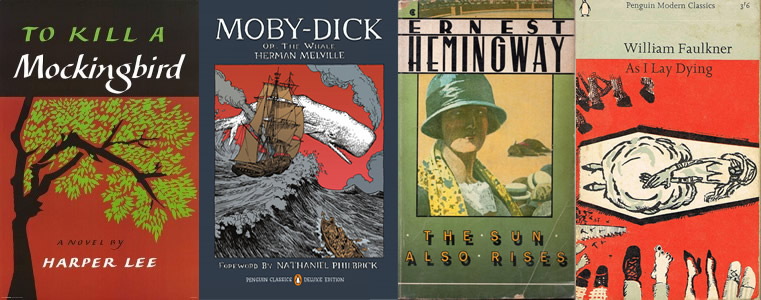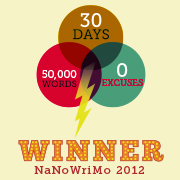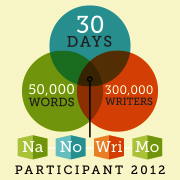Thursday
WKS1345344 (Fiction Fundamentals Part 1: Plotting and Planning on Thu at 08:00 AM – 3 hours)
Lawrence Connolly, William Horner III
“In-depth workshop: learn how to avoid extra work by planning your story and all of its elements from the beginning.”
This was easily the most useful of the day’s programs to me, although all of them added something to my arsenal of writing tools. I’ve read Story Structure Architect, but Horner’s overview on building plot spelled it out a bit more clearly for me, and Connolly’s character worksheet was the best one I’ve ever seen. I reworked a character that I have in progress while I was sitting in the seminar, and it completely lit the path to how I’ll approach writing that story.
SEM1345352 (Writer’s Craft: Don’t Tell Your Story, Show It! on Thu at 12:00 PM)
Maxwell Alexander Drake
“In-depth seminar: join author Maxwell Alexander Drake as he “shows” you some tricks to a more immersive writing style.”
Also an incredibly useful seminar – “Show vs. Tell” is something I’ve only understood in abstract, but Drake did a great job of illustrating the difference with examples that make the concept more clear, and he gave us some tools to go over what we’ve written and identify points where we’re telling more than showing. This will help especially with my NaNo novel to make sure I’m getting images on the page instead of exposition.
WKS1345347 (Writer’s Craft: The Structure of Scenes on Thu at 01:00 PM)
Brad Beaulieu
“In-depth seminar: learn everything you need to know about structuring scenes to create compelling stories.”
I’ve never felt like I had a problem writing scenes – most of mine are pretty satisfying. So I was surprised that I was getting a lot out of this particular seminar. I’ve never looked at a scene as a way to make the protagonist’s problem worse, but that’s completely true when you look closely at it – the protagonist is trying to accomplish something and every scene is a setback as the story moves forward until they work out the problem at the climax. Framing every scene like that and looking at the elements of it really helps see what’s going on.
SEM1345249 (Writer’s Craft: Should You Plot or Not? on Thu at 03:00 PM)
George Strayton, Jim Hines, Larry Correia, Scott Lynch
“Discover the benefits and pitfalls of plotting in advance and letting the plot unfold as you write.”
The short answer to the question that the seminar posed is “yes, you should plot” given that all of the writers there advocated plotting and no one was arguing the counterpoint. But it was still an interesting panel, as all members came from slightly different backgrounds. All of them had some insight into the plotting process, especially the tension between plotting and letting characters drive story – Hines noted that he plots extensively, begins writing, sees where the characters are driving the plot and then adjusts plot to make sure the characters still get where they’re going. Someone on the panel noted that some famous writer called plotting “light posts in the fog” which seems particularly apt. I thought they were quoting George R.R. Martin, but in hunting around for the quote, I discovered that Martin is one of the “letting the plot unfold as you write” advocates:
I hate outlines. I have a broad sense of where the story is going; I know the end, I know the end of the principal characters, and I know the major turning points and events from the books, the climaxes for each book, but I don’t necessarily know each twist and turn along the way. That’s something I discover in the course of writing and that’s what makes writing enjoyable. I think if I outlined comprehensively and stuck to the outline the actual writing would be boring.
SEM1345063 (Writer’s Craft: Literary Alchemy on Thu at 05:00 PM)
Brad Beaulieu, Gregory Wilson, James Sutter
“The right words can make a reader laugh, cry, or leap for joy. Explore the uncanny power of words.”
I always get a little more from seminars than I do from Panels, and the interplay between panel members sometimes loses the threads or takes you off on tangents. This one was didn’t quite catch me, as it wasn’t specific enough with examples. They broke down authors they thought were alchemists because their writing was “transparent” in the sense that they stripped down the prose to the essential, vs. writers who were more poetic with turns of phrase, but their concepts were still fairly abstract for me.
Thursday Summary:
Overall, Thursday’s panels alone were worth the cost of the four-day badge for me, because I’m getting enough out of it that it’s helping me recognize ways I can improve the stories I’m working on, and I’m inspired to sit down and tinker in a way that I haven’t really been since November’s NaNo.
Now let’s talk about women and Gen Con for a second.
Until I got the GenCon catalog today, I didn’t really have a breakdown of the speakers at the Writer’s Symposium. There are 52 authors doing presentations as part of the Writer’s Symposium. Of them, 11 are women. That’s less than 25%, slightly more than 20%. That’s problematic, as 51% of the population is women. A 30% gap between the number of women on the planet and the number of speakers at a symposium is too big a gap to write off or chalk up as a fluke. I’m sure the problematic imbalance at Gen Con is a reflection of the problematic imbalance in sci-fi and fantasy that has grown wider over the last 15 years or so… there used to be a lot more well-known women writers in those fields, even if there has long been a gender imbalance. Marion Zimmer Bradley, Octavia Butler, Ursula Le Guin, Anne McCaffrey have all died, and a new generation of women has not stepped into the limelight to replace them. I’m not sure why that is, but it certainly has a ripple effect that makes it’s way to Gen Con. I don’t know exactly what Gen Con might do about that imbalance other than being aware of it and trying to attract women to speak on panels as much as they can to offset what’s going on in the sci fi and fantasy publishing genres as a whole.
I think hearing from more women would have given me a lot of additional insight into writing and publishing that I didn’t get just from the male speakers, as great as they were. I would be curious to hear how women writers feel about job opportunities, querying publishers and agents and networking, and if they feel their experiences are more difficult or more easy than men in those areas.
After I noticed the gender imbalance among speakers on Thursday evening, I spent Friday doing a head count in each of the panels I attended, and got roughly 45-50% women attendees, so there are clearly women interested in writing who seem to be interested in sci-fi and fantasy as genres. I’m hoping asking questions of the organizers to speak to the issue and keep it in mind might improve the situation in future years.
Friday
WKS1345345 (Fiction Fundamentals Part 2: Creating Scenes on Fri at 08:00 AM – 3 hours)
Lawrence Connolly, William Horner III
“In-depth seminar: learn everything you need to know about structuring scenes to create compelling stories.”
This was another good solid workshop with some nice fundamentals – how to create tension, how to add sensory detail to help immerse the reader in the story, how to observe and convey emotion effectively, some notes on writing dialog well and some exercises in observing detail to help convey a realistic story. I’m pinning these handout pages up to my bulletin board over my desk so I’m looking at them and thinking about them as I’m writing.
SEM1345260 (Business of Writing: Career Building on Fri at 12:00 PM)
Gregory Wilson, Matt Forbeck, Kerrie Hughes
“Explore ways to make a career out of writing, and learn to build that career once you have it.”
Awesome session covering how those folks got into publishing and how to go about querying publishers and agents, what to put on your author website, how to promote your work, and what to focus on to get your career moving well. Gave me a real sense of optimism about the possibilities and a motivation to get my stuff in order and try to get people reading it and giving feedback. Kerrie was the first woman I’ve seen speak here, and I would have loved some more time to pick her brain about how she felt about women authors in her genre, since they are more rarely published.
SEM1345351 (Writer’s Craft: Point of View – What is the point? on Fri at 01:00 PM)
Maxwell Alexander Drake
In-depth seminar: join author Maxwell Alexander Drake as he breaks this confusing piece of the writing puzzle down.
Drake was great again today. I knew the basics of Point of View, but he did help highlight the advantages of different POV options and how POV should be something that you consciously choose based on your outline, not something you just fall into writing. Some aspects of your story might not be able to be told if you tell from the wrong point of view, so making the right choice can shape how your story goes.
WKS1345348 (Writer’s Craft: Tension on Every Page on Fri at 03:00 PM)
Brad Beaulieu
“In-depth seminar: discuss types of tension, as well as ways to maximize them to keep your reader glued to the page.”
Brad covered some of the same ground that Connolly and Horner did in my earlier session, but in greater scope, which was nice. His explanation of how to vary tension, how to use different types of tension and how to use short, medium, and long tension arcs over the course of the story to keep it moving made a lot of sense to me and made me want to go edit my Nano novel immediately.
SEM1345264 (Writer’s Craft: Novel Outlines on Fri at 04:00 PM)
John Helfers, Jerry Gordon, Saladin Ahmed, Brandon Sanderson, Erik Scott De Bie
“Discover the techniques and tricks for creating effective, compelling, and pitch-able novel outlines.”
It was really fun to watch everyone in the room turn into fangirls over Brandon Sanderson. He has a different technique for outlining than I had heard before, and that I thought it would be interesting to try. He picks key exciting “must have” scenes in his story and writes a paragraph synopsis of what happens in them, then puts three or four bullet points on what has to happen to get him to that scene from the previous one. That’s how he works out his own plots and how he was able to finish Robert Jordan’s work from fairly irregular notes about how the ending of the Wheel of Time saga should go. The other panelists were also strong advocates of plotting, and it was interesting to hear the critique of authors who famously don’t plot out their stories in advance – Stephen King, George R.R. Martin. I think I’m convinced that having a stronger outline is definitely something I need to work harder on. Fortunately I feel like I have a bit more insight into how to accomplish that.
Here’s another cool thing – they randomly select five or so attendees and give them free books in each of the panels, and I won a free book:
